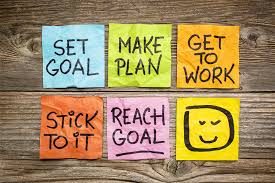COACHING - business concept
So you have identified what your goal is, how it relates to your values and created a vision board or mind map to stay focused and creative with reaching your goal. Those four future fact questions have been pondered over, you now have a clearer background to why the goal is really important to you and how it relates to your overall life and happiness.
Good job!
So, I hear you say, that’s fine and well but how do you actually start the process of goal achievement? What was I doing before that didn’t work and what do I need to do now so I am successful? Achieving your goals isn’t child’s play. We are all aware of the routine — setting up lofty goals and then pushing hard to achieve them while breaking free of that comfort zone. But that journey isn’t smooth. We can end up getting distracted, fed up. We can feel overwhelmed and frustrated when things start going downhill. Eventually, it ends with us reverting to the old ways. Sounds familiar, right?
We all struggle at some point in our life. On the other side of the struggle or perhaps better said, at the end of that struggle is success. In life, there are aims and goals that we set and eventually end up achieving. However, it’s important to make sure nothing deters you from achieving these goals. With a relentless drive, accompanied by a determined spirit, you can overcome anything that stands in your way.
So, what’s the difference between goals we eventually achieve and goals that we give up on? How can we set goals to achieve them more effectively? To answer these questions, let’s dissect the mechanics of setting goals a bit more, and review some strategies that will help you accomplish them.
The first rule of success is planning. The second rule is planning the third rule…. You get the picture. Know where you are, what you are doing and what you need to do next to get that goal completed.
- Plan
It’s simple, you cannot achieve your goals without a proper plan in place. You need to be aware of the direction you are travelling in. But that doesn’t mean you need to be aware of every single step along the way. 
Let’s consider an example here. An airplane has the specific goal of taking off and landing in a specified destination at a specified time. To achieve its goal, the plane requires a plan- a flight plan. However, one must remember that a flight plan is susceptible to change. There might be various mitigating factors behind, like turbulence, air traffic congestion etc. Similarly, to achieve your goals you need to have your own specific set of plans. Create your plan, stick to it, and adjust accordingly along the way. You don’t need to change the goal, just adjust the plans that will get you closer to them.
- Invoking Discipline
You cannot achieve any goals without proper discipline and balance. Even if you set your goals correctly, without discipline you just make the task so much more difficult. To achieve your goal, you will need to create the right atmosphere by starting habits in your life that generate discipline. You will need order in your life. Whenever things go downhill, it will become hard to stay focused on your goals. However, if you learn the art of discipline you will be able to stay calm and focused even during hardships. This is easier said than done, though. Often, your goal might get outpaced by your obligations. Have no discipline? Get yourself a personal development coach to keep you on task, focused and disciplined. Know your strengths and weaknesses. Seek support in areas you have determined will sabotage your success.
- Reduce Distractions
Human beings are easily distracted. There are numerous things in life to pull us in multiple directions, away from our goals. We veer from course, moving from one tangent to another. So, it is important you reduce the distractions in your life and remain focused.
 Analyse and search the origins of distractions in your life, and take healthy steps to eliminate them (maybe once and for all?). This may include excessive use of electronic gadgets, socialising, watching television etc. By getting rid of such distractions, you can gain so much more free time to pursue your goals rather than wasting time on things that don’t serve any meaningful purpose in your life. Distractions are time snatches, stealing hours and minutes away from your schedule. Wasting your free time. So, it’s time you take some responsibility and eliminate them.
Analyse and search the origins of distractions in your life, and take healthy steps to eliminate them (maybe once and for all?). This may include excessive use of electronic gadgets, socialising, watching television etc. By getting rid of such distractions, you can gain so much more free time to pursue your goals rather than wasting time on things that don’t serve any meaningful purpose in your life. Distractions are time snatches, stealing hours and minutes away from your schedule. Wasting your free time. So, it’s time you take some responsibility and eliminate them.
- Developing milestones
Milestones are helpful markers you create while striving towards achieving your goals. The basic step you can take here is to take your long-term goal for a specific period, say one year, and break it into little milestones. Create your own weekly or monthly milestones to stay on course. If your goal is measurable, creating your milestones should not be a problem.
For example: if your goal is to lose 10 kilos in one year, you can break that up into 1.2 kilos a month.
Milestones are more manageable and can help you visualise and achieve short-term results, eventually leading you towards the long-term outcomes. Long-term-goals might often become an overwhelming factor and are connected to individual levels of personal endurance and ambition. If long term goals are where you trip up, short-term goals are more manageable and finite, as you can approach them on a day-to-day basis.
- Time management
It’s the most vital strategy that you should be implementing while striving towards your goals. Perceive a good time management system and execute it. It will not only help you to avoid distractions but also utilise your resources to their maximum effort. Time is the greatest equaliser across our world. So, start asking yourself these simple questions.
How do you spend your time? Do you use it in the right way? Do you ensure that you are allocating sufficient time towards achieving your goals? Do you utilise it properly, or do you squander it away? If you are open and honest while answering these questions you can figure out a system suitable enough to manage your precious time. If not, again seek professional help. We are not all born with superhuman time management abilities. If it isn’t your super power than go and seek a professional who can help keep you on time and develop your skills in time management.
 And of course the tried and true acronym for goal setting and achieving is the SMART goal strategy. SMART GOALS means, ensure your goals are:
And of course the tried and true acronym for goal setting and achieving is the SMART goal strategy. SMART GOALS means, ensure your goals are:
Specific | Manageable | Attainable | Realistic | Timely.
Let’s break it down to a usable format.
Specific
- clearly define or identify what is the goal you wish to achieve.
Manageable
- Your goal must be able to be controlled or dealt with without difficulty. If it is too complicated or out of your control, it won’t be reached.
Attainable
- It must be attainable. For example, if you wish to lose 10 kilos in 2018 your goal should be 1 kilo a month. That is attainable.
Realistic
- Don’t get silly with your goals. Have a sensible and practical idea of what can be achieved or expected.
Timely
- Watch out for this. It is very easy to create a goal that doesn’t fit in with your life, your job or your relationships. Set your goals to a favourable or useful timeframe to increase your success.
Try this exercise.
- What is the specific goal? Write a SMART goal based on where you want to be in the future (use your Four Future Facts to guide you)
- How and why is it manageable?
- Why is this goal attainable for you?
- Why do you believe it’s realistic?
- What is the realistic time frame for you to reach this goal?
Goals about effort vs Goals about achievement
Lastly work out whether your goal is about effort or achievement.
- Goals about effort- Define if you goal is about effort in other words physical or mental activity needed to achieve something.
- Goals about achievement- Is your goal focused on something done successfully with skill, status or courage?

Knowing what your goal will need and its orientation will help you prepare and plan better. A goal like weight loss or a healthier lifestyle, is a goal about effort. It requires physical changes and increased mental activity to be successful. A goal about work is more about achievement. It requires new skills, changes in status or income or upgrading old skills. It requires courage and skill to stay the course and take chances.
Now you have the strategies to really get started. Sit down and plan what your goal needs, what it will require from you and others, where your stumbling blocks may be (and seek professional support if required).
Good planning!
As Winston Churchill wisely said, “Success is not final, failure is not fatal, it is the courage to continue that counts”

Leave a Reply